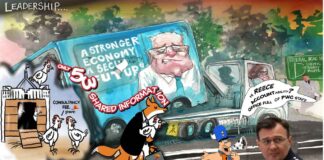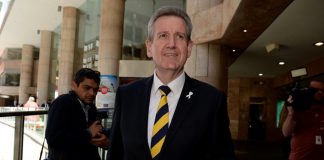The Robodebt saga was not the Public Service’s finest moment. The recent release of the National Cabinet minutes confirms that the problems of secrecy, obfuscation and ignoring legal advice are widespread. Rex Patrick explains.

When ‘self-ambition’ cells in a senior public servant’s body grow and multiply, outflanking the ‘do public good’ cells, the diagnosis may be referred to as ‘Robodebt Cancer’; named after the malignant public service cancer discovered by the Robodebt Royal Commissioner. The recent release of National Cabinet minutes has further confirmed that the cancer is more widespread than just in the Department of Social Services and Services Australia.
No-one needs the Robodebt Royal Commissioner to hand down her report next month to understand how bad the whole sad and sorry Robodebt saga has been. That’s already abundantly clear from the evidence and testimony that’s been put on the public record.
The shameful affair centred around a politically-driven cost-recovery measure progressed with little due diligence, with legal advice either not being obtained or being ignored, with Administrative Appeals Tribunal (AAT) rulings being ignored and oversight avoided, and, critical to all the shocking conduct, ambition trumping honesty and the need to care for the public.
National Cabinet formed with little due diligence
In early Robodebt hearings, the Commissioner was told how the Department of Human Services (now Services Australia) progressed the scheme, despite serious doubts within the Department of Social Services about its legality, after it earned the backing of Social Security Minister Scott Morrison. The normal checks and balances were pushed aside, as senior public servants rushed to implement what their political master wanted.
National Cabinet, and particularly the Cabinet confidentiality elements of it, was also progressed at the insistence of Prime Minister Scott Morrison. He got the National Cabinet idea from Health Minister, Greg Hunt, on the morning of 13 March 2020. By that afternoon Morrison had announced the idea to the Council of Australian Governments (COAG), advising the first meeting would take place two days later.
No legal or procedural checks were carried out on the confidentiality elements of it. The terms of reference were formalised in a 48 hour period.
Again, top level public servants rushed to please their master.
It was not until July 2020, after a number of liberty restricting and large economic decisions had been made by National Cabinet, that I decided to challenge the legality of its confidentiality. As a test case, I sought access to the minutes of a single meeting.
I was, of course, refused access, but appealed the matter. It was then argued in May 2021 before a Federal Court judge by Senior and Queens Counsel.
In August 2021, Justice White issued a comprehensive 82 page decision where he opined that “a committee does not become a committee of the Cabinet for the purposes of the FOI Act merely by being given that name,” and found that National Cabinet was not a committee of the Federal Cabinet.
I was happy. The vault had been cracked open. In September 2021 the Government confirmed they would not appeal the decision.
Tribunal ruling ignored
Off the back of Justice White’s decision, I promptly made a further request of the Department of Prime Minister and Cabinet (PM&C), this time requesting the minutes of the first 10 National Cabinet meetings.
I was then somewhat surprised when, on 12 November 2021, I received a response from a PM&C decision maker, Assistant Secretary Angie McKenzie, refusing me access to the minutes on the grounds that they were Cabinet documents – the same claim that had been overturned by Justice White.
I was disturbed. As occurred with Robodebt, considered rulings of the AAT were being ignored. On 23 November 2021 I went into the Senate Chamber and let fly. The Hansard recorded what I said.
“Ms Angie McKenzie clearly has no idea of how the law works, even. It’s a disgrace that this sort of material comes from the office of the Prime Minister and Cabinet, an organisation that’s supposed to be the pre-eminent department in the Commonwealth. I actually think Ms McKenzie has breached her obligations under the Public Service Act. What’s happened is [that] she has not just trimmed her political sails, she’s actually put up her Liberal Party spinnaker to make this decision.”
Public service commissioner weighs in
A week later the Public Service Commissioner, Peter Woolcott, joined with then Secretary of PM&C, Philip Gaetjens, to complain to the President of the Senate about my calling out a public servant.
The Public Service Commissioner is the person charged with the direct responsibility of strengthening the professionalism of the Australian Public Service and upholding high standards of integrity. He’s paid $845,650 per annum to do so.
Woolcott, a former staffer to both Andrew Peacock and Alexander Downer, sat in the Public Service Commissioner’s role for much of the period of sharp decline of professionalism revealed by the RoboDebt Royal Commissioner.
He presided over Public Service standards while people were tragically taking their own lives at the hands of a RoboDebt team acting with reckless indifference to the law that had been explained to them by the AAT.
He was saying nothing about the Robodebt cancer in Social Services and Services Australia, but he criticised me for making a cancer diagnosis inside PM&C.
He’s still not said anything of note publicly about the Robodebt cancer. He has been talking about it privately at the Secretaries Board, a secret conclave of departmental heads that meets once a month; but in the final weeks of his term as Commissioner he seems to have developed the cancer himself, unreasonably refusing to release his presentation under FOI laws.
Departmental back-down
I took the decision of Angie McKenzie back to the ATT. Last week, in an embarrassing moment for those who fostered the cancer inside PM&C, the Secretary of PM&C ordered a back-down.
They had lawyered up, at much expense to taxpayers, but there was no chance they were going to win. So they capitulated, thereby avoiding another humiliating AAT decision.
I wonder what Ms McKenzie, Mr Gaetjens and Mr Woolcott think about the back-down.
Maybe it’s mission accomplished? If the goal was to delay the release of the documents until they had little political relevance, they achieved that.
I’ll never know. I’m not a Royal Commissioner inquiring into a cancer, and I’m no longer a Senator who can bring them to account.
New leadership on to the fix?
Part of me would like to think the decision to capitulate was one of strong leadership by the new Secretary of PM&C, Professor Glyn Davis AC, who took over when Prime Minister Albanese sacked his predecessor, Gaetjens.
But I’m not so sure, because a new outbreak of the cancer has taken place on his watch. Sadly, a lawyer inside the Prime Minister’s office has recently decided she knows better than the Full Court of Australia, denying FOI access to the Prime Minister’s diary to a number of people including myself.
It’s another case of a public servant thumbing their noses up at the judiciary and the rule of law.
This article was originally published by Michael West Media



















